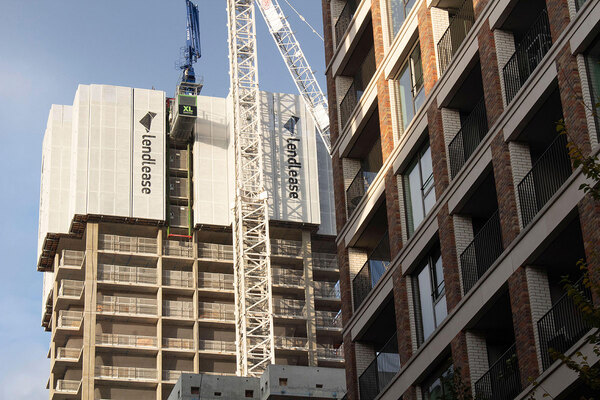You are viewing 1 of your 1 free articles
Landlords forced into ‘rethink’ amid soaring number of contractor insolvencies
Housing associations are being forced to rethink their relationships with SME house builders and construction firms to help ward off insolvencies and provide stability to development pipelines.
Inside Housing has spoken to a number of landlords about the rise of insolvencies among small and medium house builders and the impact it is having on their development plans.
Two associations said they have been directly impacted by bankruptcies within the past six months.
The concern comes after the news that 360 house builders went bust during the past financial year, a year-on-year increase of 75%.
An analysis by accountants Price Bailey revealed that it is mostly SME house builders that are being squeezed out of the market due to a number of factors. These include increasingly restrictive planning rules and rising material, labour and energy costs, all of which disproportionately harm small builders.
More widely, the number of construction firms going bust is also soaring as the sector feels the impact of inflation, Brexit and the ongoing war in Ukraine.
A number of financial professional told Inside Housing that bond costs have doubled over the past year as investors go through a period of being more risk averse, in part due to rising gilt yields and a sharp increase in spreads that began with the invasion of Ukraine in February.
Gerraint Oakley, executive director of growth and development at Platform Housing Group, said the risk to SME house builders is part of a much broader challenge facing the sector.
“There are many different factors to consider, many of which have been significantly affecting the construction of new homes, but are now much more damaging in light of the threats of an inconsistent (often unreliable) planning system, rising costs and skills shortages,” he said.
He added: “When we look at the people affected when we lose these SMEs, we are losing critical skilled labour that exists in so many of them and their broader supply chain. When we lose these people, it’s quite often the case that they don’t come back.
“We know SMEs can’t flourish in this financial climate unless they have a guaranteed pipeline. A secure pipeline that one, or a group of housing associations, could provide could be the lifeline that many of these businesses need.”
Mr Oakley pointed out that the top 10 landlords combined have huge development pipelines and he appealed to SMEs to approach Platform and other housing associations to discuss where they can target growth areas together.
He added: “We’ll still be working against tough conditions in the sector, but as well as sharing the risk, it is about sharing the gain, too. Our decision-making is based on values, how we want to work with other people and how we best make those relationships work.”
One association, which wished to remain anonymous, said it was on the cusp of signing a design and build contract for the development of flats in London, but the contractor pulled out due to insufficient funds in their company to make the project viable through the building phase.
The association said: “This leaves the project vulnerable as there is no easy way to take on board another contractor at this point of the development phase.
“The vulnerability of the market, investors being very risk averse and the general instability of product suppliers has made this a very tricky phase for small [registered] providers [RPs].
“We are looking to rethink relationships with small construction companies and environmental housing material suppliers so that they can provide a secure and financially stable pipeline from the construction point of view for the small RP in the development of small to medium schemes.”
Another anonymous landlord said this had become an increasing issue for the company after two contractors went bust in the past six months, which affected three of its developments.
This resulted in increased costs of delivery, delayed rental income and customers waiting for homes. The landlord said this highlights several issues from a risk perspective.
The landlord said: “The cost of bonds are currently too high and don’t cover the losses of an insolvency, parent company guarantees can’t be put in place for SMEs, and increased scheme retentions hurt developer cash flow.
“We are also finding that some SMEs are overexposed in the market and this is hard to pick up other than by word of mouth because credit checks rely on historical data.
“Options we are looking at include two-stage tender to enable testing of costs and delivery capacity, ensuring subcontractor supply chain is mostly identified pre-contract to give price/delivery assurance, potentially direct payment of supply chain.”
Sign up for our development and finance newsletter
Already have an account? Click here to manage your newsletters
Sign up to the Social Housing Annual Conference 2022
The Social Housing Annual Conference is the sector’s leading one-day event for senior housing leaders, which delivers the latest insight and best practice in strategic business planning. The conference will provide multiple viewpoints and case studies from a variety of organisations from across the housing spectrum, including leaders in business and local and central government.
Join your peers for a full day of intensive, high-level learning, networking and informed debate addressing the most crucial topics surrounding finance, governance and regulation to help the sector understand and manage the pressures it faces.
Find out more and book your delegate pass here.













